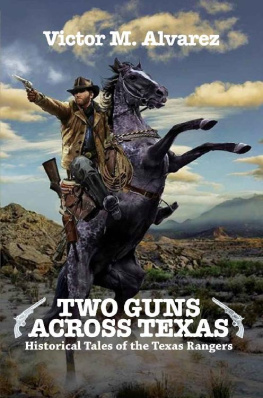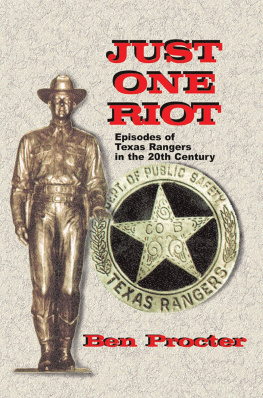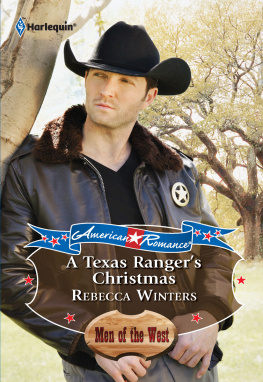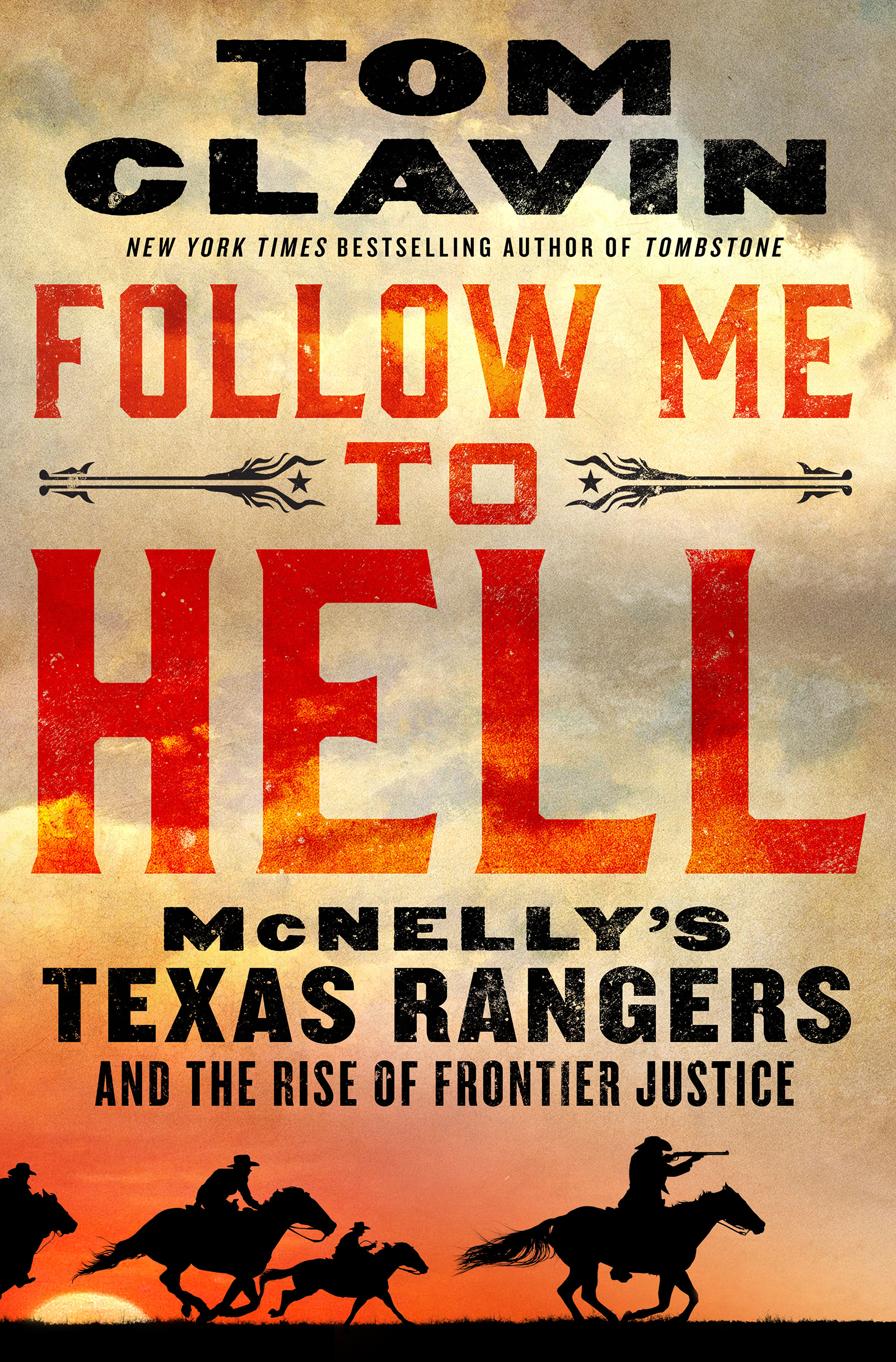Contents
Guide
Pagebreaks of the print version
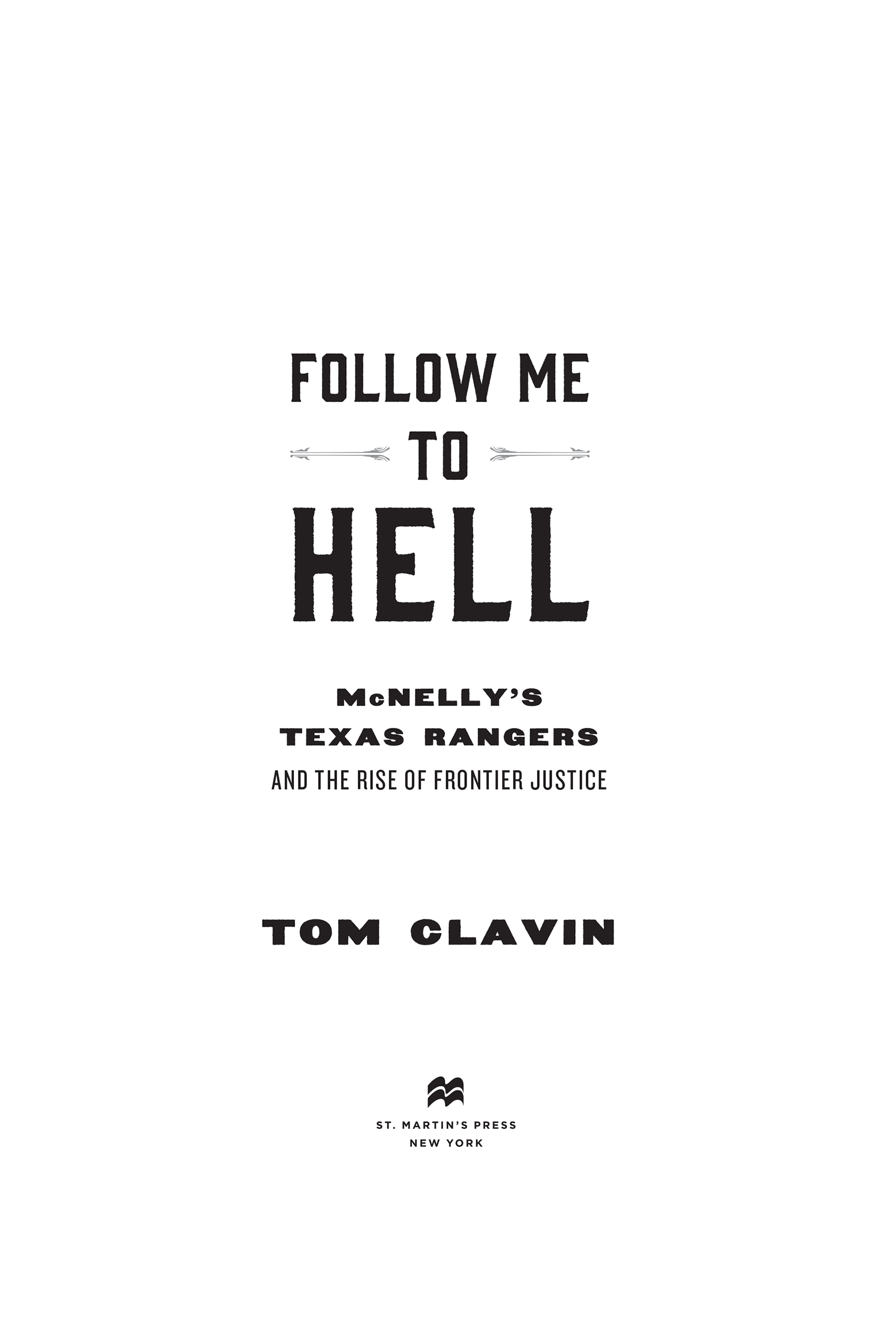
The author and publisher have provided this e-book to you for your personal use only. You may not make this e-book publicly available in any way. Copyright infringement is against the law. If you believe the copy of this e-book you are reading infringes on the authors copyright, please notify the publisher at: us.macmillanusa.com/piracy.
In memory of my son,
Brendan Clavin
Some readers may be aware that I am the author or coauthor of a whole wagon train of books that are inhabited by a wide array of wonderful real-life characters. But writing about Leander McNelly was a special challenge. Let me amend that: Writing about the Texas Rangers was a special challenge and then there was McNelly on top of that.
This book is not intended to be a history of the Texas Rangers. However, to set the stage for the adventures of McNellys Rangers in the mid-1870s, it seemed that including as much history of the Rangers as readers would tolerate was necessary. What made this additionally challenging was that one can consult, say, three sources of information on the Texas Rangers and be presented with three different versions of the same event. Just one example is the Texian-Karankawa fight at Skull Creek, which is said to have involved anywhere from eleven to twenty-five Texians and to have taken place in late 1822 or February 1823.
Such contradictions, I have often found, can be attributed to accounts provided by not the most reliable eyewitnesses on the frontier, whether that frontier is Kentucky, Kansas, Arizona, or Texas. But in the specific case of the Texas Rangers, many tales both tall and small have been spun during the last two centuries by a variety of tellers, and some previous writers have cherry-picked the most lets say, useful ones. Some researchers and writers have made valiant efforts to separate factsas best they could be determinedfrom fiction, and those are the sources I have tried to pay the most attention to.
Because this book is not necessarily a history of the Texas Rangers, not all events and participants leading up to the 1870s have been included. Using my judgment, for better or worse, I have presented an overview of the main events that had an impact on southeast Texas before the Civil War.
And then there is Leander McNelly. He is one of the more revered figures in the Texas Rangers history. However, not only was he captain of a company for less than three years but also the men he commanded were not technically Rangers but members of the Washington County Volunteer Militia. And at least four of them wrote about their experiences, with each account differing significantly from the others. These discrepancies do not diminish the achievements of McNellys Rangers, but they do indicate that trying to write a true story about them can seem like a Sisyphean task.
But it was one worth undertaking. I am not contending that McNelly was the greatest of all Ranger captains. Very strong arguments have been made on behalf of John Coffee Hays, John Rip Ford, and John B. Jones, among others. But many Texas Rangers historians will agree that Leander McNelly was a transitional figure. He represented both the old Ranger ways and the new Rangers that evolved into the modern police force of today. McNelly was, without question, the most effective Ranger captain of the mid-1870s when this transition began. As Frederick Wilkins points out in his indispensable The Law Comes to Texas: The Rangers of the 1870s and following decades were little changed from the men of the 1840s and 1850s. In one basic improvement, for the first time a Ranger force was permanently established. This prospect of permanency corrected a defect in all of the earlier Ranger units; an experienced cadre of Rangers was maintained in service. Frontier justice had arrived.
One might think that McNelly, given his stature in the Texas Rangers history, was a formidable figure whose very presence caused evildoers to surrender. This was not true physically: He was barely five foot five and 125 pounds, dressed almost like a dandybrush jacket, duck pants, calfskin leggings, sometimes a beaver hatand wore his long beard neatly trimmed. However, his menoccasionally referred to as Little McNellys in newspaper accountsfollowed him because of the force of his personality, devotion to law and order (as he saw it), and undeniable courage. He was indeed one of a kind.
One more note about Follow Me to Hell: Indian was in common usage during the decades that I am writing about, but it is not nearly as common today. To this author, the word Indian is not by itself derogatory when used as a definition of Americas aboriginal inhabitants. Still, I have endeavored to use as often as possible persons names and/or tribal affiliations to keep usage of Indian to a minimum.
Okay, now that we got that out of the way, lets pretend weve gathered around the campfire and a tale of legendary peopleespecially Leander McNellyis about to be told.
It was a bright, unusually mild late-autumn morning when the men known as McNellys Rangers rode away from Richard Kings ranch on fresh horses and, for those who needed them, new saddles. At a brisk pace, the riders searched for the vigilantes and bandits who had terrorized the Nueces Strip.
Their captain was Leander McNelly. Most descriptions of him echo that of Doug Swanson in his book Cult of Glory: [He] was short, gaunt, thin of voice, and racked by tuberculosis. To a newspaper correspondent of his day, he appeared as the very reverse of robust. One of his own menan ardent admirerdescribed him as sick and puny a little runt of a feller. At the peak of his career, he was sometimes so weak he could barely stand.
But his company of Rangers would obey his every word and display as much bravery in action as he did. Now, in November 1875, they were undertaking their most dangerous mission yet. To enforce the law, they might have to go south of the Rio Grande even if an invasion of Mexico triggered a war.
As they neared the border, McNelly told his men to stop and restand double-check their pistols, rifles, and ammunition while they were at it. They did so, then drank from their canteens, mopped their weather-beaten faces, and readied themselves for arriving at the river.
Once the Rangers were rested enough and prepared to get on their new mounts, their captain addressed them: Boys, McNelly began, I may lead you into hell, but Ill get you out if you do exactly as I tell you to do. Ill never send you into a battle, Ill lead you. All I ask any man to do is follow me.
The forty men climbed up onto their saddles, formed a phalanx behind their captain, and headed south. Once in sight of the Rio Grande and the inhospitable terrain beyond, many of McNellys Rangers wondered if this was only their first view of hell, and they inched their horses closer to the captain.
No man in the wrong can stand up against a fellow thats in the right and keeps on a-comin.
Ranger Captain Bill McDonald
It is generally agreed that Stephen Austin created the Texas Rangers with a few strokes of his quill pen in August 1823. In this call to arms, he did indeed use the word rangers, but before this missive there already were rangers in Texas. It would take two years before Austins group were called the Texas Rangers.





